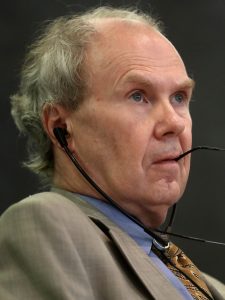As the global community continues to grapple with the coronavirus (COVID-19), the Atlantic Council is open for business. Our business, meetings, and events, however, are occurring virtually. For more information, please read an update from our President and CEO.
Description
Episode 2 of The GeoTech Hour.
AI is rapidly becoming the next playing field for great power competition between the United States and China. Worried about losing out, countries and state conglomerates around the world have begun pursuing their own policy regimes and strive for digital sovereignty, but many express hesitancy to pick sides and fear of a confrontation that only knows losers. It seems as though the political winds have changed so dramatically that America’s win-win approach towards China and international cooperation has turned into a lose-lose situation, involving the slow reversal of globalization. At the same time, opportunities for improved data and technology collaborations exist, both between India and the United States, as well as potentially other friendly nations such as the UAE, Israel, Canada, the, UK, Australia, Europe, and more.
With optimism prevailing in many places, there remains universal agreement that technologies are critical to social progress and global development. While advanced economies may have seen the greatest gains so far, enabling poorer societies to use emerging technologies and leapfrog into much more advanced stages of development is crucial. At the same time, within societies, no ethnic, racial, or other minority group should remain disadvantaged while technology exists to help reduce class divisions. Necessary to pave the way for such an uplifting process is cooperation within and among countries at a global, national, and sub-national level. Yet, despite allegedly shared goals, global cooperation remains an uphill battle, not the least because of Sino-US tensions and an international system in chaos.
Over the course of one year, experts from the Atlantic Council’s GeoTech Center organized meetings in Paris, Brussels, and Berlin, traveled to Beijing and Shanghai, and held virtual conferences with India and Africa, all the while trying to answer two questions: What are the geopolitical implications of emerging technologies and how can countries build smart partnerships amid the widening gyre? Listen in, as they discuss key takeaways with high level participants from India and Germany, evaluate collaboration opportunities between the United States and its partners, and give a glimpse on how data and tech might impact geopolitics in the years ahead?
Featuring
Ambassador Michael Schaefer
Chairman of the Board
BMW Foundation Herbert Quandt
Former Ambassador of Germany to the People’s Republic of China
Mathew Burrows, PhD
Director, Foresight, Strategy, and Risks Initiative
Atlantic Council
Asha Jadeja Motwani, PhD
Founder
Motwani Jadeja Foundation
Julian Mueller-Kaler
Resident Fellow, GeoTech Center & Foresight, Strategy, and Risks Initiative
Atlantic Council
Hosted by
David Bray, PhD, Director, GeoTech Center, Atlantic Council


